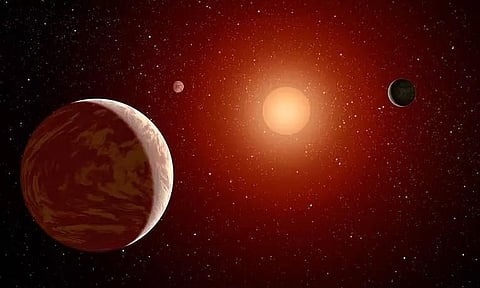Scientists Find Proof of Possible 'Water Worlds' Orbiting Small Stars
CHICAGO: Water maketh the world. Without Water, it is impossible to think about our lovely planet Earth. About 71% of our Earth is composed of Water which we see in the form of Massive Oceans, Calming Seas, and Quiet Lakes.
Scientists have turned every stone in finding a world similar to our Earth but have not been successful in their endeavours. But a recent study reported that many planets actually do contain large amounts of water, though not of 'Earth standards' but considerable enough for some living beings to exist.
The water on these planets does not exist in the form of earthly water bodies like Oceans, Seas, or Lakes but is trapped in the rocks of the planet. These amazing results of the study were reported in the journal Science.
A Postdoctoral researcher at the University of Chicago and the first author of the study Rafael Luque said, " It was surprising to see so many water worlds orbiting the most common type of star in the galaxy. This also means that there is considerable scope for the search of habitable planets". Luque along with fellow researcher Enric Palle of The University of Astrophysics of the Canary Islands and The University of La Laguna conducted the research.
The researchers took a population-level approach to analyze a group of planets that are spotted around M-dwarf, a type of star which is the most commonly seen star in our galaxy, and scientists have detected many planets around them.
According to Palle, different approaches to studying a planet reveals different aspects of the planet.
The scientists combined two measurement techniques to unearth the composition of 43 planets in the Milky Way galaxy. They found that these planets were made up of half rock, half water, and a lighter molecule.
As per Jacob Bean, an exoplanet scientist from the University of Chicago, the finding was surprising as many had earlier thought the planets were dry and rocky. He added that while the evidence is intriguing, he would like to see more concrete proof suggesting that one of the studied planets is a water world.
Also Watch:

